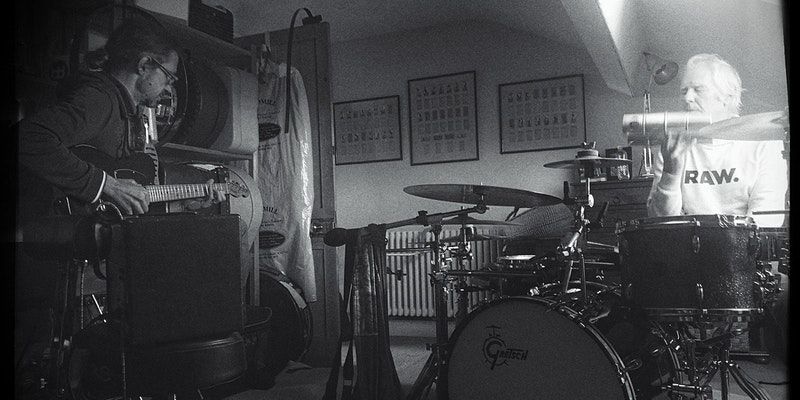Philip Watson's Bill Frisell, Beautiful Dreamer: The Guitarist Who Changed the Sound of American Music (Faber and Faber) moves centre stage as thoughts turn to early-2022 as a key jazz title. Carefully paced and skilfully delivered the biography is based on interviews with the great US guitarist Bill Frisell and some of his close colleagues, family and friends. Peppered extensively with contemporaneous magazine and newspaper reviews of Frisell’s work plus detailed explanatory narrative on this generally reckoned to be super-shy individual, the text is also interspersed with Counterpoint question-and-answer listening sessions drawing in musicians familiar with Frisell’s work. The book title can be thought of as partly a tip of the hat to the 19th-century Stephen Foster ballad and parlour song that featured on Frisell’s 2010 album Beautiful Dreamers but acts too even as a shorthand description of Frisell himself given the dreamy, orchestral haze of his sound that jazz lovers have got to know and admire down the decades.
The biography begins deliciously with a story that is referred to in passing a few times in the text dubbed ‘‘The Frisell Dream’’ that the guitarist first was aware of 30 years ago. In it the musician, who was born in Baltimore in 1951 and grew up in Denver, enters a large mansion, climbs a winding staircase to eventually ascend a ladder where he meets a trio of miniature monks who begin to reveal some important truths to him.
Reading the book in consecutive chapters but skipping the Counterpoint texts to keep these to turn to last to avoid disrupting the flow of the main narrative is a good way into the text. Reading these all later, each one grounded in a Frisell album, proves rewarding with big names participating including Paul Simon, The Bad Plus and Gavin Bryars. That Q&A aspect of this part of the book is less good, more magazine-like perhaps, and yet one that lends itself to reading while listening to the album immediately in focus.
Frisell, who turned 70 earlier this year, is one of the most influential living jazz artists in the world today and Beautiful Dreamer is persuasive in backing up such a claim. He has a sound that is utterly and instantly recognisable. One fascinating element underlined by Watson’s convincing narrative is that unlike a lot of performers Frisell is not an extrovert and so that makes a biographer’s job more difficult.
Watson does not make the mistake of wading too deeply into speculative psychological investigation although clearly he likes to try to put Frisell under his own authorial microscope at least enough to peel away some of his more inscrutable layers. Watson sketches Frisell’s American and Swedish lineage early on, explores how supportive Bill’s father and mother were in encouraging his love of music, and how he eventually finds love and stability in his relationship with his wife of many years Carole d’Inverno.
There is a fair amount of testimonialising from an all-star cast of musicians cited that could have proved bulky. A lot of people interviewed and layered rapidly into the narrative understandably say a good deal of positive things about Frisell. Watson however manages to be frank about his subject regardless while serving all this up and the tone does not clang a discord in the process. He manages to tease out notions of character flaws or weaknesses in this quiet man so the story stands up more. We also get a strong sense of Frisell's mischievous sometimes sweary cartoonish sense of humour.
Watson has been an admirer of Frisell for many years and clearly knows his work intimately having attended numerous concerts, absorbed the recordings in vast detail as well as striking up a rapport with his subject as the text makes clear. Significantly from a fan point of view there is plenty of analysis of Frisell’s prodigious discography that stacks up into a big task in itself. But this is not a technical, musicological, kind of book in any classroom textbook sense. The furthest Watson goes in this regard is to guide us through Frisell's ‘‘promiscuous’’ choice of guitars to prise out what different instruments and pedals mean to Frisell.
A steady if sometimes relentless navigation in the chronology of the progress of Frisell’s recording career unfolds. And it is interesting to discover within all this detail over 500 pages certain pivotal moments including how the guitarist’s relationship with ECM spluttered, conked out and then eventually years on was resuscitated. What also is clearly sketched-out are Frisell’s defining relationships with prominent figures along the way notably his hero Jim Hall with whom he took lessons and later recorded and by complete contrast the experimental, inspirational, work he found with the avant-garde composer John Zorn. Significantly Frisell’s long-time work with Paul Motian is not at all underestimated by Watson.
The book is a treasure trove of deep dives and insights into the heart of Friselliana. Frisell’s obscure Belgian period intrigues even more. That was the time in his life when Frisell first met and started going out with his wife-to-be Carole at a time when he was gigging with saxophonist Steve Houben and who he even recorded with alongside Chet Baker in the late-1970s.
Frisell co-operates fully with Watson who has worked as a high-profile men’s magazine editor for titles such as UK versions of GQ and Esquire. The author goes the whole nine yards with his research and so the picture of the subject we gain is certainly not a surface one. We instead get more of an inkling of what makes Frisell tick from a variety of sources not least his wife, daughter and tour manager and also gain an idea of what his ‘‘shyness,’’ key to his personality hitherto in media profiles, actually means behind the headlines.
The publication date of Beautiful Dreamer is 17 March
Tags:

